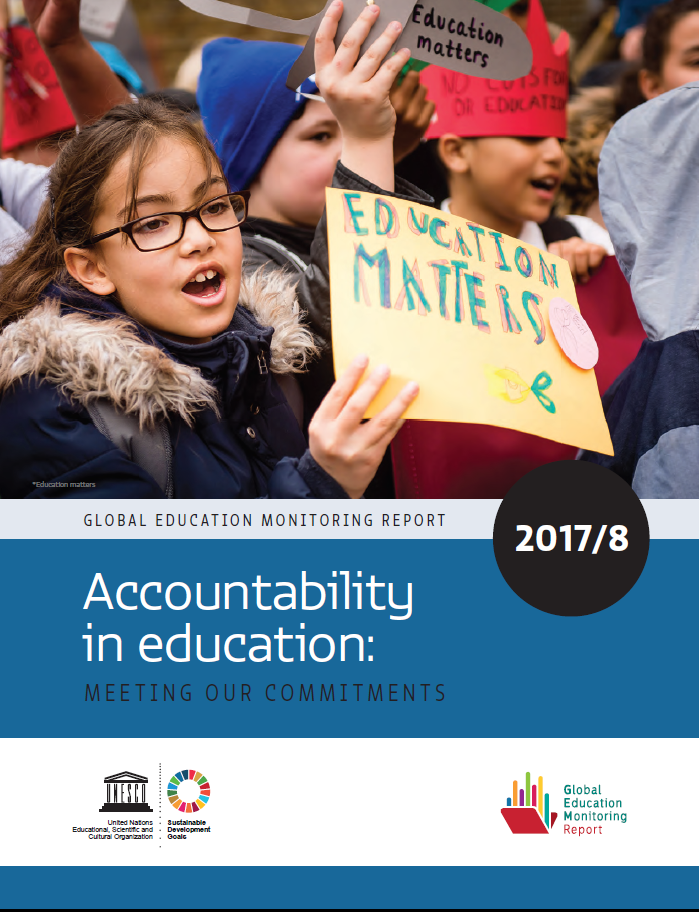Accountability in education : Meeting our Commitments. Global Education Monitoring Report 2017/8
Abstract
There are today 264 million children and youth not going to school – this is a failure that we must tackle together, because education is a shared responsibility and progress can only be sustainable through common efforts. This is essential to meet the ambitions of Sustainable Development Goal on education (SDG 4), part of the 2030 Agenda for Sustainable Development. Governments, schools and teachers have a frontline role to play here, hand-in-hand with students themselves and parents. Moving forward requires having clear lines of responsibility, knowing when and where those lines are broken and what action is required in response – this is the meaning of accountability, the focus of this Global Education Monitoring (GEM) Report. The conclusion is clear – the lack of accountability risks jeopardizing progress, allowing harmful practices become embedded in education systems. For one, the absence of clearly-designed education plans by Governments can blur roles and mean that promises will remain empty and policies not funded. When public systems do not provide an education of sufficient quality, and for-profit actors fill the gap but operate without regulations, the marginalized lose out. Governments are the primary duty bearers for the right to education, yet this right is not justiciable in almost half of countries, and the primary course of action for those with a complaint is lost. Everyone has a role to play in improving education. This starts with citizens, supported by civil society organisations and research institutions, who point out gaps in quality, equitable education. In a number of countries, student movements have often swayed policies on equitable and affordable education, highlighting the power that we all share and must exercise to advance SDG 4. International organisations have been in the lead also in shaping new goals and targets in line with the complex challenges of our times. The Report shows also that not all accountability methods are currently helping us achieve SDG 4. In some parts of the world, it is becoming more common, for instance, for teachers and schools to be sanctioned for
poor test results, in the name of purported attempts to improve quality instruction and learning. The Report concludes this must be approached with great caution to avoid having unintended, contrary consequences. There is extensive evidence showing that high-stakes tests based on narrow performance measures can encourage efforts to ‘game the system,’ negatively impacting on learning and disproportionately punishing the marginalised. It is vital to collect data on learning outcomes, to shed light on factors that drive inequality in education. But drawing precise conclusions requires time, resources and skills that few countries have, and drawing the wrong conclusions can be all too easy.
Collections
Related items
Showing items related by title, author, creator and subject.
-
Proyecto Educativo Nacional al 2021 : balance y recomendaciones 2018-2020
CNE. Consejo Nacional de Educación; Guzmán Rivas, Almendra; Rosas, Ricardo; Estefanía Sánchez, María Teresa (PEConsejo Nacional de Educación, 2021-07)El Proyecto Educativo Nacional (PEN) propone un horizonte común que oriente las políticas educativas y propicie su continuidad. El PEN fue desarrollado en un momento de transición democrática para el país y, luego de un ... -
Proyecto Educativo Nacional, PEN 2036 : el reto de la ciudadanía plena
CNE. Consejo Nacional de Educación (Consejo Nacional de Educación, 2020-07)La actualización del Proyecto Educativo Nacional —que el Consejo Nacional de Educación presenta al país y a sus autoridades en virtud del encargo recibido por parte del Ministerio de Educación— tiene como intención definir ... -
Elementos para un Plan de desarrollo de la educación peruana (PDEP) 2026 - 2031
Acosta Pantlik, Maritza; Aller Zárate, Román; Alvarado Cerdán, Silvia; Barr Rosso, Paul; Cárdenas Pinto, Tania; Espinoza Peralta, Gustavo; Lema Martínez, Yanina; Quezada Reyes, Zoila; Reyna Motta, Diana Milagros; Rojas Luján, Francisco Fidel; Rosas Lezama, Ricardo; Soto Hurtado, Daniel; CNE. Consejo Nacional de Educación (PEConsejo Nacional de Educación, 2025-11)A cinco años de la aprobación legal del PEN al 2036, persisten problemas estructurales que obstaculizan el logro de sus propósitos: una vida ciudadana afectada por la débil cultura ética, cívica y de legalidad, la desconfianza ...


